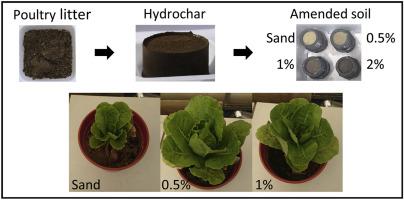Journal of Environmental Management ( IF 8.0 ) Pub Date : 2020-06-20 , DOI: 10.1016/j.jenvman.2020.110959 Vivian Mau 1 , Gilboa Arye 2 , Amit Gross 1

|
The conversion of poultry litter to hydrochar has been proposed for stabilization of the soils and to eliminate pathogens. Still, research on the hydrochar's effect on soil properties as a function of production temperature, and its direct use with plants is limited in general and even less so on poultry litter. We characterized poultry litter hydrochar as an amendment for sandy soils in terms of changes to the soil's bulk density, porosity, water-retention capacity, and fertility. Soil bulk density, porosity and water-retention capacity were determined in a pneumatic tension plate system for sand with hydrochar-amendment rates of 0.5, 1 and 2%, and hydrochar-production temperature of 180, 220, and 250 °C. Soil fertility was assessed by growing lettuce seedlings in a randomized block design planter experiment, consisting of 16 blocks that were sampled every 10 days. The addition of poultry litter hydrochar resulted in decreased soil bulk density. Soil porosity increased with hydrochar generated at a temperature of up to 220 °C, and decreased with hydrochar generated at 250 °C. Soil water content increased as compared to unamended sand, but decreased with increasing hydrochar-production temperature, probably due to increasing hydrophobicity of the poultry litter hydrochar. The addition of hydrochar at concentrations of 0.5 and 1% resulted in improved plant growth despite an initial delay. While increased soil moisture due to increased soil water-retention capacity was confirmed, it did not seem to be responsible for the improved plant growth. It was also demonstrated for the first time that hydrochar decreases nitrate leaching from soils. Therefore, poultry litter-derived hydrochar seems to be an adequate amendment for sandy soils.
中文翻译:

家禽垃圾水炭作为沙质土壤的改良剂。
为了稳定土壤和消除病原体,已经提出将家禽垃圾转化为水炭。尽管如此,关于水焦炭对土壤性质的影响取决于生产温度的研究,其在植物中的直接使用通常受到限制,而对于家禽垫料则更少。我们将家禽垃圾碳氢盐的特征定为沙质土壤的改良剂,可改变土壤的容重,孔隙度,保水能力和肥力。在气压拉力板系统中测定了沙粒的土壤容重,孔隙率和保水能力,沙粒的炭化率分别为0.5%,1%和2%,炭化温度为180、220和250°C。通过在随机分组设计播种机实验中种植生菜幼苗来评估土壤肥力,每10天采样16个块。添加家禽垃圾炭会降低土壤容重。土壤孔隙度随温度在220°C以下产生的炭化而增加,并随温度在250°C下生成的炭化而降低。与未处理的砂相比,土壤含水量增加,但随着炭生产温度的升高而下降,这可能是由于家禽垃圾炭的疏水性增加所致。尽管最初出现延迟,但添加0.5%和1%浓度的水炭仍能改善植物的生长。虽然已确认由于增加了土壤保水能力而增加了土壤水分,但这似乎与植物生长的改善无关。还首次证明了碳氢化合物可减少硝酸盐从土壤中的浸出。因此,











































 京公网安备 11010802027423号
京公网安备 11010802027423号